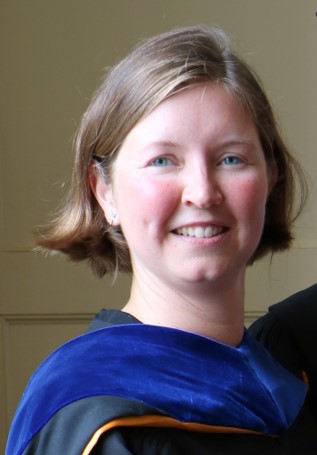Who’s Who: Dr. Allison Walker: The Fungal Fun Gal!
By Mike Butler
Acadia University, Wolfville’s biggest employer, is known worldwide as a leader in education and it is a beautiful, essential piece to Wolfville’s notoriety. From Acadia, there have been many extraordinary people who’ve been a part of the Grapevine Who’s Who column. They’ve been leaders in their field and great contributors to the campus life and the future of its students. It’s always nice to have the opportunity to write about someone I’ve never met and know very little about what they study. So, Dr. Allison Walker was a real treat to encounter.
Dr. Allison Walker is a mycologist (a biologist specializing in fungi) and Associate Professor in the Department of Biology at Acadia University. She lives in Wolfville with her husband and two sons. She says, “We moved here from Ottawa in 2014 when I began my position at Acadia. I grew up in Haliburton, Ontario, a wonderful small community like Wolfville. My studies of the fascinating kingdom fungi have taken me to the University of Toronto (undergrad, Botany), the USDA Systematic Botany and Mycology Laboratory in Maryland, USA, the Gulf Coast Research Lab in Mississippi (MS and PhD, Coastal Sciences, specializing in Marine Mycology), AAFC in Ottawa (postdoc in mycology) and now beautiful Nova Scotia where I am teaching the first-year Biology, a 3rd year courses in Mycology and Plant Growth & Development, a 4th year course in Molecular Biology techniques, and co-leading a field biology course including intertidal mycology on beautiful Bon Portage Island (Outer Island), near Barrington, NS.†And all this stemmed from a visit to Wolfville on a honeymoon trip… it was love at first sight!â€
Allison’s main role is to study and document the biodiversity of fungi, with a focus on marine and coastal fungi. To do this, her fungal dream team at Acadia employs traditional microscopy methods and also molecular biology approaches such as DNA barcoding, genomics, and metagenomics; sometimes they even discover and describe species that are new to science. Because fungi are everywhere, her studies take the students to such diverse places as the Acadian forest, Valley onion fields, bogs, saltmarshes, mudflats, vineyards, and breweries.
“Early camping trips in Algonquin Park, Ontario and undergraduate courses in mycology with Dr. David Malloch at the University of Toronto kindled my obsession with the weird and wonderful world of fungi,†she says. “Mycology tends to attract passionate people keen to get the message out about the many important and often overlooked roles fungi play in our world – fungi can harm us, heal us, provide tasty food and drink, and even help make acid-washed jeans!â€
Allison also serves as Director of Acadia’s E.C. Smith Herbarium, which houses 20,000 fungal specimens. “I find teaching to be very rewarding as you feel you are making a difference in people’s lives every day (usually in a positive way!), and as our teaching is informed by our research we are constantly learning new things and using creativity and innovation to engage students,†she says. “I am a strong proponent of hands-on learning and field biology. One of my MSc students and I recently returned from presenting our research at the 11th International Mycological Congress in San Juan, Puerto Rico, attended by 900 fungal scientists from 58 countries. It was exciting to share our biodiversity knowledge of the Bay of Fungi (I mean Fundy!) with them.â€
This beautiful valley is a perfect spot for Allison and her work to flourish. She loves the access to nature, the diversity of habitats, the incredible sense of community, and also, the local food and beverage industries! Her graduate research in the coastal saltmarshes of the Gulf Coast US and postdoctoral research on Acadia forest conifer endophytes have provided her with a diverse background that enables her research to span agricultural, forestry and marine sectors in Nova Scotia.
Allison attributes her success to many helpers along the way. “My family including my in-laws, have encouraged me to follow my dreams and been an incredible source of support, including my husband, who is a bird biologist,” she says. And, of course, her kids — she adds, “for keeping things real.”
“Incredible teachers have changed my life, starting with my parents who were both elementary school teachers,†she says. “My colleagues and mentors at Acadia challenge and inspire me and I truly believe we have the best undergraduate Biology program in Canada thanks to the dedication of these excellent teachers and scholars.â€
Life-changing events in Allison’s career have included Hurricane Katrina and the Deepwater Horizon oil spill, both affecting where she was living during her graduate training on the US Gulf Coast. “These events led to my interest in saltmarsh restoration using fungi, and the role of fungi in breaking down environmental contaminants,” she says.
Allison’s future looks bright! She is motivated by her desire to educate and promote an interest in fungi to everyone, to help people see the interconnectedness of the natural world including the tiny things we often overlook, and to make new discoveries about the roles of fungi in ecosystems. “Don’t think of it as summer winding down-think of it as fungal decay season gearing up!” she says. Her future plans include finding ways to involve interested members of the community in her research program and our herbarium (citizen science, science communication) and to continue to increase educational opportunities for Acadia students to conduct research, travel and have field experiences in biology. All the best to you Allison and stay fungal!
